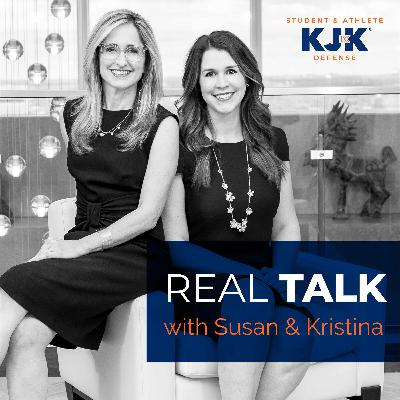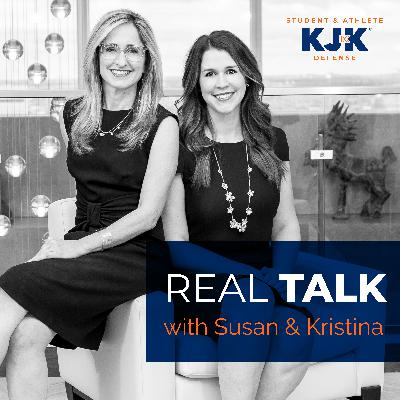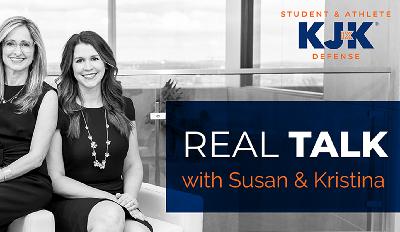Big Changes coming to the SAT! How This Impacts Your Student
Description
In this episode of Real Talk, KJK Student Defense Attorneys Susan Stone and Kristina Supler are joined by Mark Coffin, the owner and President of Academy Custom Test Prep. In this episode, they talk about the sweep changes coming to the SAT. Topics include what big changes are coming to the SAT, how colleges are responding to those changes, and what strategies students should consider when preparing for either the SAT or ACT.
Links:
Academy Custom Test Prep: https://academycustomtestprep.com/
Show Notes:
(01:45 ) What are the Big Changes to SAT in 2024
(04:49 ) How will the SAT be different?
(06:58 ) Some Key Differences Between the SAT and ACT
(07:34 ) What the new SAT Focuses on with Reading and Grammar
(09:52 ) The Mysterious Logic Behind Taking the SAT Online
(12:08 ) The Biggest Change to Taking the SAT
(12:54 ) Cheating: Varsity Blues Scandal Explained
(14:10 ) All Scores are Not Created Equal
(14:33 ) Adaptive Tests: Are They Equal?
(17:08 ) Will Colleges Know if You Got a Hard or Easy Test?
(18:15 ) Will the new SAT be of Any Value?
(18:39 ) The Response from ACT
(19:55 ) Do Colleges Prefer SAT over the ACT?
(21:37 ) Should Students Go with the ACT?
(22:43 ) A Simple Strategy Students Can Use to Prepare for the SAT
(24:40 ) How Colleges Are Responding to the SAT Changes
(26:33 ) Tutoring versus Self-Prep: What works better?
Susan Stone: Kristina, is this the first time we're recording a podcast and we're not together?
Kristina Supler: It is and it feels weird. I feel so alone.
Susan Stone: I was gonna say, I feel so disconnected from you. This is so weird everyone. You know that we're always attached at the hip, but I'm in New York and I.
Kristina Supler: I'm in our studio in Cleveland, Ohio, and, we're gonna do this with technology today, and I think we're gonna be talking about technology a lot today.
Susan, what are we talking about today?
Susan Stone: Oh my gosh. We're gonna talk about the changes to the SAT because there's a lot happening and I'm gonna also wanna delve into, is the ACT gonna do the same thing, it's. The time of year where everybody's trying to get their last scores in before college applications go out.
So good time for this talk. And, with that, why don't you introduce our guest?
Kristina Supler: Sure. We are joined today by Mark Coffin. Mark's the proud owner of Academy Custom Test Prep. ACT P helps students with the ACT , SAT, P-SAT and GRE tests, as well as common app essays and other college admissions essays.
So Mark, thanks for joining us today.
Susan Stone: Happy to be here.
So Mark, big changes are coming to the SAT in 2024. Yeah. Complete. Describe the dun da. So can you describe the changes?
Mark Coffin: Sure. It's a complete revamp. The, college board who, runs both the P-SAT and SAT testing, they make up the tests and score 'em and all that.
They made major changes to the SAT in 2016. So this isn't a long time for them to have had this new test. They made it then much closer to the ACT. Now effective with the P-SAT. This fall they're given traditionally in the high schools to juniors, sophomores, and juniors in October of each year.
So this fall, both sophomores and juniors will take the new version of the P-SAT, which will be very much like the new version of the SAT. The first new SAT will be in March of 24. So current juniors who pretty much have already taken some of these tests, have taken the old s a, the current SAT.
The new one will be for current sophomores and younger kids starting next March. Now a current sophomore could in fact take SAT tests this fall. There are, four testing dates. And take the current version on paper. But starting with March, it's going to be a very different format, for a number of reasons.
Number one, the test is gonna be completely online. So there'll be no printed tests. Students will take it at testing centers, not at home, designated as they do now, but they can use their own computers or they, a computer will be provided when they go in and get ready for the test and start, their computer will basically be frozen. So they can't use it for research or texting or anything else they might want. And they download through a link, the new SAT test. And so they will have their own test on their machine or on a provided machine that's online and everything must be done online.
The test will be shorter. It's currently a little over three hours. It's gonna be two hours. They're shortening it by combining some of the sections and reduce, just simply reducing the number of questions. The current SAT has a reading section. And a writing or grammar section. And those will now be, those are now separate sections.
You finish one and then go on when the time's up to the next one. And then it current one has two math sections. One without a calculator. You can't use a calculator. And then one with a calculator. And again, you do the non calculator. You finish when the time's up. You go on to the next one.
Susan Stone: Mark. I just wanna interrupt, how did they know whether you have a calculator or a non calculator?
Do the proctors manage that? Yeah, the proctors.
Mark Coffin: The proctors are walking around and they see you with a calculator. you're kicked out. so
Kristina Supler: it sounds like it's almost, it's a really different test.
Mark Coffin: It's different in a lot of other ways too. One hugely important way, which I'll get to after I've covered the more, the simpler questions. So the current two sections that are reading and grammar, they call it writing and language, are gonna be combined into one section so you don't finish big. That's a big, that's a big change. That's a big change. In the, reading part, in the current test, you generally have around 11 paragraphs to read, eight to 11, and then you answer 10 or 11 questions about each paragraph.
So you have to be not only a perceptive reader, but a pretty quick reader because I'll give you a lot of time. The current, the new test will reduce this, I think, to four passages for the reading with one question and just be a paragraph with only one question per paragraph. The, reasoning is that students will have more time to absorb the material and answer one sort of more broader question about the point of the paragraph so they have more time to ponder it in effect.
Susan Stone: Mark,
Kristina Supler: is that easier?
Yeah, it sounds like they're in some ways watering the test down. Am I wrong?
Mark Coffin: The questions are not easy. I don't think it's easier. It's easier in the time sense. You're not hurried to read a paragraph and answer 10 or 11 questions. Because you have to have pretty good recall to read a paragraph and then immediately go to the questions and remember 11 different answers.
Now it'll be one answer. And I've taken a practice test. Khan Academy, which many







